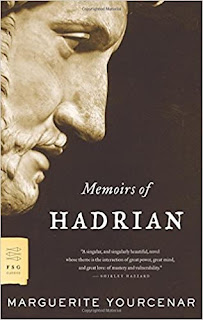One
of the most important skills a student must be acquirer when learning
history, amongst others, is the ability to evoke a state of empathy
for the time period under study. Names, dates, and events can only
provide us with the obvious and superficial; however, in my opinion,
to actually attempt to place oneself emotionally at a particular
place on the time-line can give us greater insight and a much more
profound understanding. Through this method, too, history is not
merely words on a page, but something tangible and relevant.
Memoirs
of Hadrian
conjures the world of ancient times through the eyes of the Roman
Emperor, Hadrian, with such sensual accuracy that, wholly or in part,
a conscious attempt at 'suspension of disbelief' is not necessary,
because one can sit back and let the author do it for you...Yourcenar
is a magician at literary prose. In her 'Reflection on the
Composition', she writes a curious comment:
"Time
itself has nothing to do with it. It is always surprising to me that
my contemporaries, masters as they consider themselves to be over
space, apparently remain unaware that one can contract the distance
between centuries at will." (276)
This
is a unique and somewhat mysterious skill to have, and a skill every the historian should possess or at least learn because history is so
vital to the present day.
This
is a magnificent novel because it combines historical erudition with
a superlative prose style, placing the reader into the time of one of
the most fascinating Roman Emperors of the second century. As is well
known to students of ancient Rome, Hadrian came to power after
Trajan and stopped Rome's imperialist expansion, concentrating his
efforts on domestic issues, enriching culturally, Rome and her
colonies. Hadrian was an expert politician, a man of letters, artist,
visionary, philosopher, investigator of the divine, poet, and lover.
He is known as the traveling Emperor because he spent most of his
reign abroad, visiting Rome's many colonies.
This exquisite text's overall theme is a man's confrontation with
his mortality through recalling and narrating his life. Death is the
central theme of this book. Hadrian is writing his memoirs to his
benefactor, Marcus Aurelius, the philosopher Emperor, describing his
life and passing on what wisdom he thought he had gained over a long
and full existence. Here is a man who confronted life with a
fundamental curiosity and wanted to face death with his eyes wide
open...
This novel is a classic and a must for historians and lovers of literature.





No comments:
Post a Comment